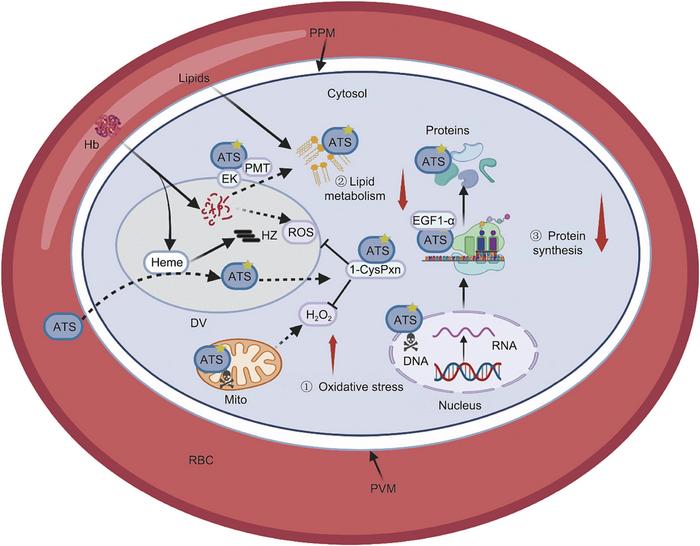Jigang Wang et al. have made significant progress in unraveling the antimalarial mechanisms of artemisinin (ART) and its derivatives. Their latest research, published in the journal Engineering, sheds light on the crucial target proteins and pathways of ART, providing valuable insights into combating malaria and addressing emerging ART resistance.

Credit: Peng Gao et al.
Jigang Wang et al. have made significant progress in unraveling the antimalarial mechanisms of artemisinin (ART) and its derivatives. Their latest research, published in the journal Engineering, sheds light on the crucial target proteins and pathways of ART, providing valuable insights into combating malaria and addressing emerging ART resistance.
Malaria continues to pose a serious threat to global health, despite the widespread use of ART and its derivatives, which have significantly reduced the global burden of the disease. To address this ongoing challenge, it is crucial to understand the exact antimalarial mechanisms of ART. The research team utilized a combined strategy involving mass spectrometry-coupled cellular thermal shift assay (MS-CETSA) and transcriptomics profiling to identify a group of putative antimalarial targets of ART.
By employing MS-CETSA, the team identified potential antimalarial targets of ART based on the principle that drug binding events affect the thermal stability of the targeting proteins. The results were then combined with transcriptomic analysis to determine the critical antimalarial target proteins and corresponding causal pathways. Subsequent validation experiments on five prospective protein targets revealed that ART may function against malaria parasites by interfering with redox homeostasis, lipid metabolism, and protein synthesis processes.
“These findings provide fresh perspectives on the antimalarial mechanisms of ART and offer crucial insights into several proteins involved in parasite survival that can be targeted to combat malaria,” said Jiaming Wu, the editor of the Engineering. “With signs of emerging ART resistance observed in some regions, understanding the exact mechanisms of ART is of utmost importance.”
Artemisinin and its derivatives are currently the cornerstone drugs of malaria therapy. However, the emergence and spread of ART resistance underscore the need for greater knowledge of its antimalarial mechanism. The identification of critical targets and pathways serves as a stepping stone for the rational optimization of existing artemisinin-based combination therapies (ACTs) and the development of strategies to alleviate ART resistance.
The research not only clarifies the antimalarial mechanism of ART but also establishes potential methodologies for mechanistic studies of other antimalarial drugs. These findings will contribute to the ongoing efforts to combat malaria and improve global health outcomes.
The paper “Profiling the Antimalarial Mechanism of Artemisinin by Identifying Crucial Target Proteins”, authored by Peng Gao, Jianyou Wang, Jiayun Chen, Liwei Gu, Chen Wang, Liting Xu, Yin Kwan Wong, Huimin Zhang, Chengchao Xu, Lingyun Dai, Jigang Wang. Full text of the open access paper: https://doi.org/10.1016/j.eng.2023.06.001. For more information about the Engineering, follow us on Twitter (https://twitter.com/EngineeringJrnl) & Like us on Facebook (https://www.facebook.com/EngineeringPortfolio).
About Engineering:
Engineering (ISSN: 2095-8099 IF:12.8) is an international open-access journal that was launched by the Chinese Academy of Engineering (CAE) in 2015. Its aims are to provide a high-level platform where cutting-edge advancements in engineering R&D, current major research outputs, and key achievements can be disseminated and shared; to report progress in engineering science, discuss hot topics, areas of interest, challenges, and prospects in engineering development, and consider human and environmental well-being and ethics in engineering; to encourage engineering breakthroughs and innovations that are of profound economic and social importance, enabling them to reach advanced international standards and to become a new productive force, and thereby changing the world, benefiting humanity, and creating a new future.
Journal
Engineering
DOI
10.1016/j.eng.2023.06.001
Article Title
Profiling the Antimalarial Mechanism of Artemisinin by Identifying Crucial Target Proteins
Article Publication Date
24-Jun-2023




